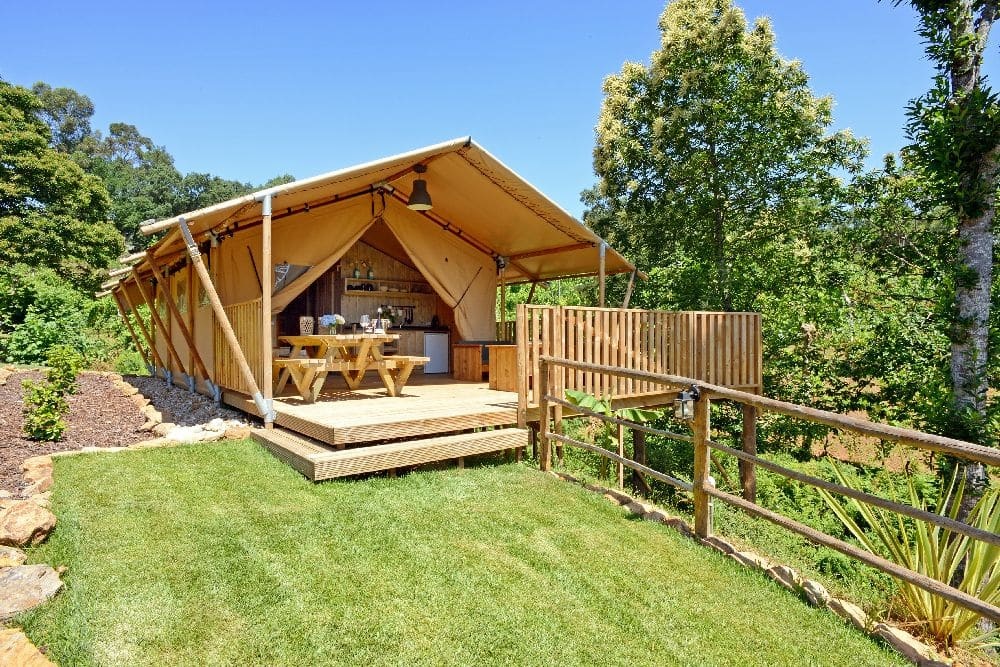How to Extend the Lifespan of Your Glamping Tents

The time has finally come — your first glamping season is about to start. The luxurious safari tents you purchased from us have been built and perfectly set up on your campsite. The first guests have booked their trips and will be arriving soon. Let the holiday season begin! We are sure that you want to keep your glamping tents in pristine condition for as long as possible. This way your guests can enjoy them for many years to come. Here are some helpful tips to max out the lifespan of your glamping tents.
- Give your guests care instructions for the safari tents

Woody Safari Tent
First, the most important thing you should do is tell your guests how to care for the safari tents. You can provide this information in a number of ways. We strongly suggest having an instruction sheet in each safari tent. You can also give an instruction sheet to your guests upon their arrival or even visit your guests when they arrive to explain how to use the safari tent. To minimize the risk of damage to the glamping tents’ material and to prevent future leakages, it is best to make your guests aware of some key things.
- Instruct your guests not to hang wet towels or laundry over the canvas. Your guests could easily be tempted to hang their wet towels after visiting the pool but this is not good. It can damage the canvas and decrease its water-resistant properties.
- Ask your guests to not place chairs or other furniture directly against the canvas. Doing so can cause friction when the furniture rubs against the tent fabric. This can damage the material and potentially cause leaks.
- Grease and oil are not good for the safari tents because they affect the water-resistance. Ask your guests to avoid touching the canvas as much as possible.
- Advise your guests to provide good ventilation if they cook in the safari tent. Good ventilation reduces condensation on the canvas.
- Tell your guests to always make sure the kitchen appliances and the gas are turned off when they leave the tent or go to sleep.
- Use extra protection outside the holiday season
Our safari tents have been treated to protect them from UV-radiation and other weather influences, making them resistant to mold and dirt. Over time, the continuous exposure to UV light and the elements can affect the protective properties of the canvas. We have a winter pack that can be used outside of the holiday season to provide additional protection of the canvas against various weather and environmental effects. Using this winter pack is optional. Contact one of our colleagues who would be happy to tell you more about this option.
- Place the glamping tents at an optimal location on your site
Decide which spot is best for the glamping tents before you position them on-site, You want the glamping tents to be placed in a way that meets your guests’ expectation and also extends the life of your tents. Here are some suggestions for positioning your tents.
Suggestions for positioning your glamping tents near the forest
Is your campsite near a forest? Do you want the glamping tents near the forest? Then try and have a little distance between the trees and the safari tents. This allows enough space for daylight and wind to circulate keeping the tents well ventilated and enabling them to dry easily. Use a mild 3% chlorine solution and a soft brush to remove any mold or algae growth. Afterward, rinse the canvas well with water
Suggestions for positioning your glamping tents near the sea
If your campsite is in a coastal location we advise using extra measures to keep your tents beautiful. Remove salt deposits from the canvas and PVC roof with a soft brush before and immediately after the holiday season. This will keep your safari tents in good condition. It is important to remember to clean the ends of the wooden frame. Sand and salt residues will cause the wood to remain wet for longer and that can lead to early rot.
- Keep your tents fresh and clean
Do not use soap to clean the tent cloth if there is mud residue on the tent or the groundsheet. Soap causes the material to deteriorate and reduces its protection against mold and leaks. Good ventilation is important. Leave the safari tents open during good weather when they are not being used by guests.
- Regularly check your glamping tents
After guests leave we recommend checking the glamping tents to make sure that there is no damage and that everything has been left neatly. Pay attention to the small details, like the zippers, during this check. If a zipper is no longer working correctly then you can easily repair it. This will prevent you from having to replace the entire zipper. Lubricating the zippers annually helps keep them in good condition.
We advise regular checks of the safari tent’s rattles and tensioning. This check is particularly important before and after stormy weather. The tent can better withstand strong winds the tighter it is. Be careful not to stretch the tent too tightly because doing so can damage the zippers. To make sure your glamping tent remains fixed, check that the black straps are properly secured after you have adjusted the tension. If you keep the tents secured with ‘normal’ tension and the zippers clean then you are helping the pullers do their job by keeping the glamping tent in place.
